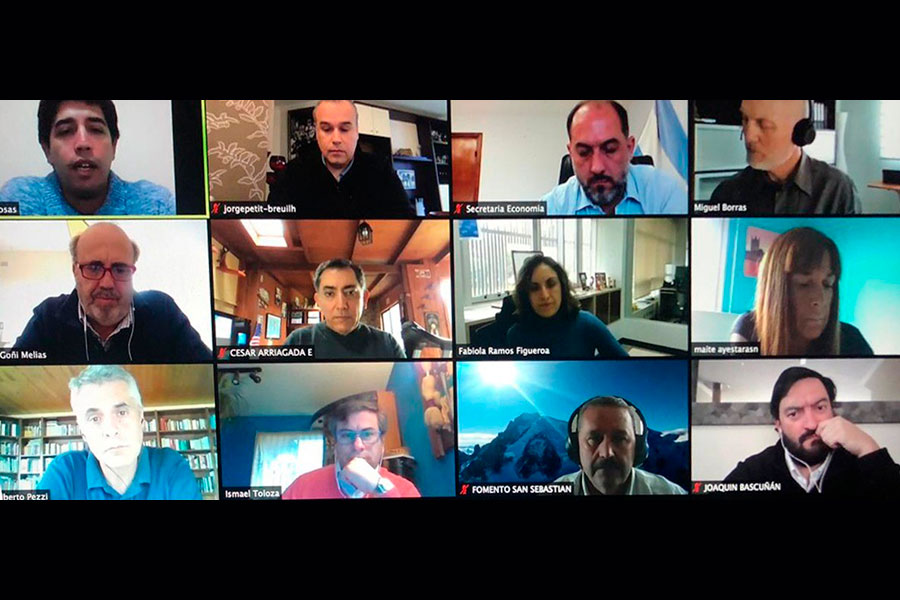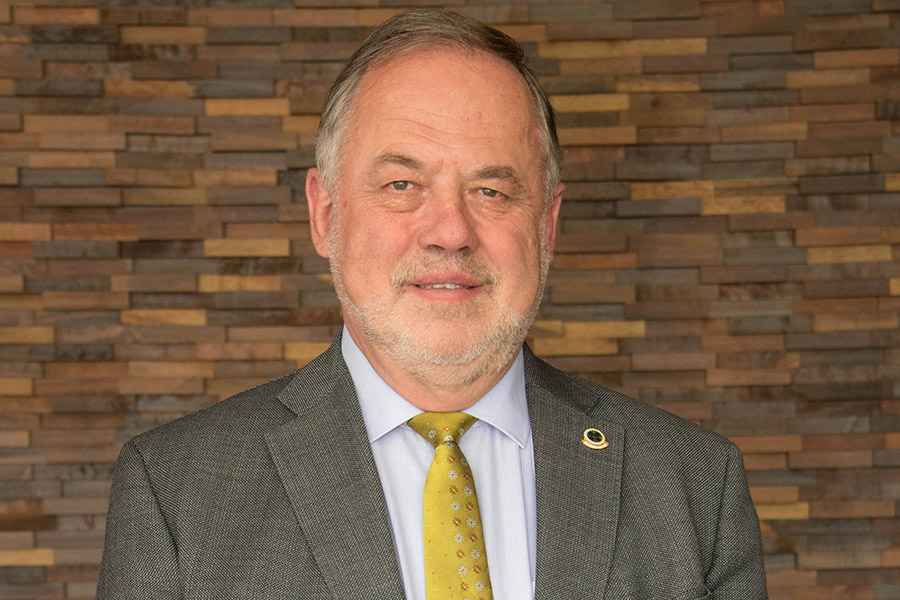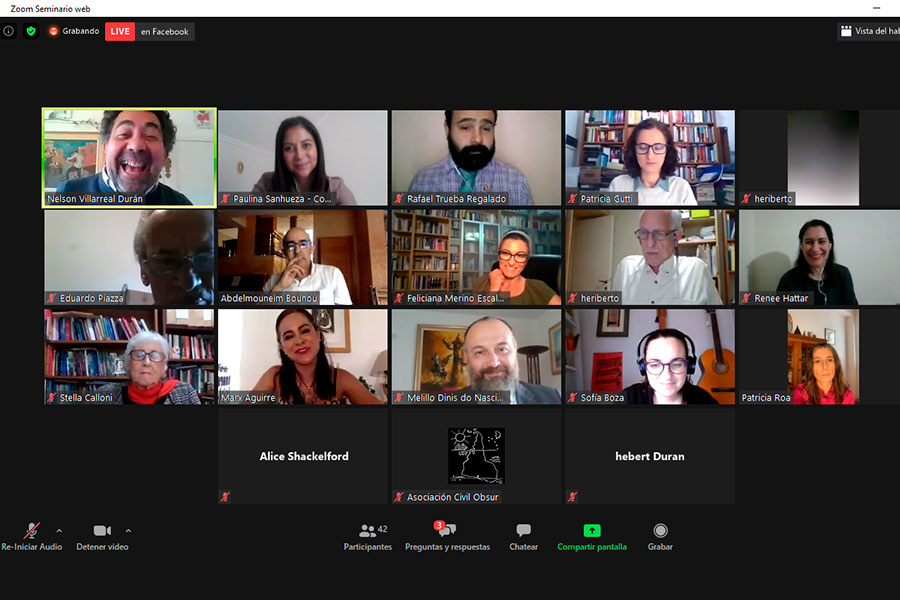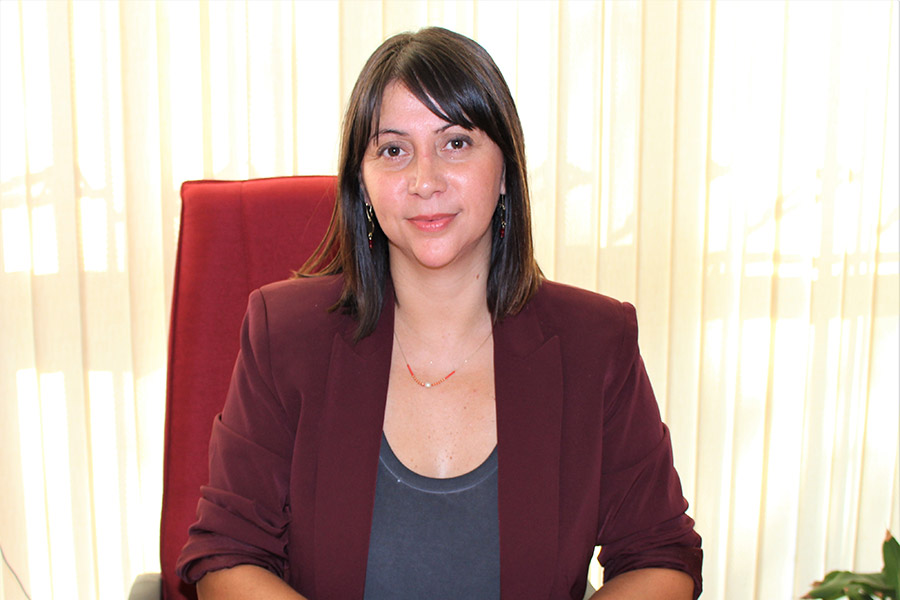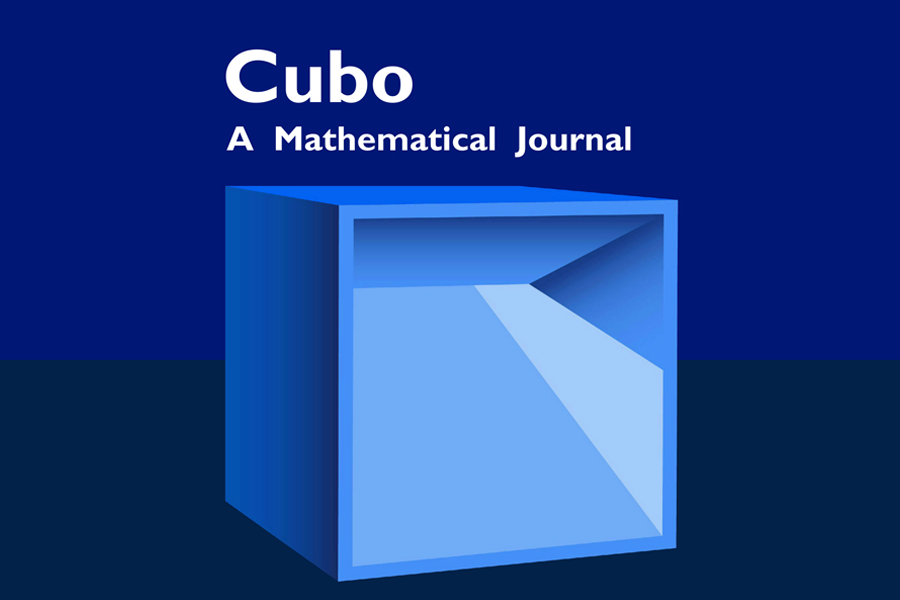|
The online conversation brought representatives from the Basque Country, Catalonia, Valencia, Mexico, Colombia, Argentina and Chile together. |
“Visions of the future” was the name of the conference organized by the Institute of Local and Regional Development (IDER) of the Universidad de La Frontera (UFRO), which brought representatives from the Basque Country, Catalonia, Valencia, Mexico, Colombia and Argentina, as well as from Chilean universities and UFRO together. During the meeting, the participants analyzed different alliances in accordance with each country’s visions and perspectives of the future, the construction of sub-national information, technological watch and other issues that will affect the post-pandemic reconfiguration of these countries. According to Camilo Rosas, the acting director of IDER-UFRO, “the meeting was organized in consideration that, after the pandemic, we are going to need a collaborative strategy between all the actors who are thinking about development within specific geographical conditions. The intention was to share experiences, points of view and to explore new possible ways of collaboration in order to be able to continue contributing to the development of our respective territories, by strengthening our relationships of reciprocal collaboration and by carrying out joint initiatives”. It should be noted that the Institute has been working for almost 20 years and currently consists of five units, being in charge of community planning, statistical analyses, technology watch, public policies and further training, as well as the development of its renowned graduate program in human development in the south of Chile. Written by: IDER-UFRO |
|
It is an important step forward for the UFRO program in terms of international cooperation and the innovation of teaching. |
The Doctoral Program in Communication, which is imparted by the universities Universidad de La Frontera (UFRO) and Universidad Austral de Chile, has recently been incorporated to the international network Laspau Co-Lab of Harvard University. The mission of this network is to strengthen the quality and impact of higher education and it is an important recognition of the management, which has been promoting the program’s internationalization. This achievement opens up new opportunities for scholarship programs and the innovation of teaching. Dr. Carlos del Valle Rojas, the director of the doctoral program, stressed that there has been an emphasis on internationalization, since they believe that it is one of the key factors for a doctoral program. “We had the opportunity to join this collaborative network of Harvard University, which has the mission to strengthen higher education. Our incorporation is based on our collaboration with the University of Groningen in the Netherlands, with which we have developed a double degree agreement and joint publications,” he explained. The network of Laspau Co-Lab is mainly oriented towards teaching, innovation and the collaboration between universities in North, Central and South America. In this context, Dr. del Valle added that the PhD students of UFRO will benefit from this link through the scholarship system offered by the network and through the possibility of incorporating the Perusall platform, which will be a great support for the classes of the program and which will achieve an important innovation of teaching, since it is a tool that allows the students to do their readings in a more collaborative, participative and interactive way. “An optimal preparation of the basic readings for the contents of the courses is essential for us, and Perusall works with leading open access university publishers, such as Harvard University Press, Cambridge University Press, Oxford University Press, Princeton University Press, University of Michigan Press, and so on,” he said. In this context, Dr. del Valle pointed out that, as a first step, the aim is to make the Perusall platform available for the different courses and to get access to the network’s scholarships. Then, as a second step, the idea is to carry out joint activities, such as joint publications, seminars and research projects, with an international outlook and global importance. WEBINAR As a next step, and as one of the first activities within this network, the doctoral program is organizing a webinar that will take place on September 24, about the use of Perusall as a teaching support tool. This webinar will be led by Dr. Pablo Valdivia, an academic member of the doctoral program at UFRO, and John A. Paulson, a researcher of the School of Engineering and Applied Sciences at Harvard University. Written by: UFRO Communications Office
|
|
|
It may be true that COVID-19 is here to stay – at least until a vaccine is found – but what is definitely never going to leave is the digital age. Although it has gradually been establishing itself over the last years, this pandemic has clearly made it evolve more than ever through the use of the Internet, technological devices, ICT tools, forums, chats, blogs, the media, and so on. It is deeply transforming our habits, language, life and customs, and is installing a permanent digital culture. Our society and the world have changed and we must be fully aware of that. This pandemic and the digital age are forcing us to leave old and harmful practices behind – with incredible speed – in order to reshape everything and to adapt. It is a new way of governing, living and working. All of that is happening in the so-called VUCA context, which is an acronym for volatility, uncertainty, complexity and ambiguity, and describes the current environment in which institutions and people move. It is a scenario in which we are forced to adapt to the continuous changes that burst into our daily lives and affect our routines on the professional, family, economic and social level, amongst many others. Nevertheless, if we manage to be aware of the nature and dynamics of these changes, as well as the speed with which they occur, we can work on new structures and more flexibility. This also implies a great number of challenges, for individuals as well as companies or institutions. Therefore, we must develop digital skills, knowledge and attitudes that can turn this pandemic into something useful after all.
|
|
The academic member of the Faculty of Law and Business had an important role in the dialogue about the potential impacts of the current pandemic. |
Dr. Paulina Sanhueza is an academic member of the Department of Management and Economics of the Faculty of Law and Business (FCJE) of the university Universidad de La Frontera (UFRO). In her role as a general coordinator of the Ibero-American Network of Development Studies (RIED), she participated in the international online seminar called “Perspectives on the impacts of the pandemic”, which is an initiative that has its origin in the collaboration between the Institute of History of the Faculty of Law of the University of the Republic (Uruguay) and RIED. The objective of the seminar was to discuss and clarify the potential impacts of the current pandemic and health crisis that the world is facing on the economy and on social, cultural and environmental aspects. Dr. Sanhueza indicated that there is no doubt that we are currently facing one of the deepest recessions since the beginning of the 20th century; with significant negative effects on economic growth, and significant increases in the levels of unemployment, poverty, exclusion and inequality. In this regard, she pointed out that “the academic network – I currently have the honour of coordinating it – wants to help. It wants to become a space for the promotion and facilitation of capacities and to create a dialogue that provides knowledge and contributes to the dissemination of different experiences regarding the pandemic and its effects on global and territorial processes of development”. Twelve international speakers, who all have extensive experience from their work in higher education institutions and international organizations, such as the ILO, UN Women and others, attended the seminar. They presented and discussed the experiences of Brazil, Mexico, Spain, Argentina, Morocco, Chile, Jordan, Costa Rica, and Uruguay and addressed aspects related to the relationship between COVID-19 and the different dimensions of development from different disciplinary perspectives. Written by: Karen Campos
|
|
The confirmation sent by Scopus stressed the quality of the articles and the trajectory of this journal, which belongs to the Department of Mathematics and Statistics of the university Universidad de La Frontera. |
Some of the reasons that allowed CUBO “A Mathematical Journal” of the Universidad de La Frontera (UFRO) to be included in the main collection of the worldwide renowned international database of Scopus are the quality of its contents, its trajectory, its continuous development, and the hard work and commitment of the university. There are three research journals in mathematics in Chile, and two of them are indexed, including CUBO, what adds prestige and international visibility to the university and the Department of Mathematics and Statistics of the Faculty of Engineering and Sciences, which publishes this journal. “We are very proud of this important achievement, since it recognizes CUBO as a leading magazine in the creation of knowledge with global relevance. This is also a recognition of the editorial staff, the level of publications and the management of all the processes involved,” Dr. César Arriagada, the Research Director at UFRO, said. CUBO has a long history. Its origins date back to 1985, mainly with expository articles; in 1999 it turned to the field of education in mathematics; in 2004 it became an official research journal and in 2008 a development strategy was adopted that allowed it to be indexed by SciELO in 2011. In 2016, all efforts were aimed at its internationalization and access to new and better databases. “This progress is the result of years of hard work in the Department of Mathematics and Statistics. Today 95% of the articles published correspond to foreign authors, 70% of the reviewers are also external. The interest in publishing has increased significantly, as well as the quality of the papers and authors. Now the challenge is to achieve the WoS indexation,” says the current editor in chief, Dr. Rubí Rodríguez. Dr. Mauricio Godoy is the executive editor of the journal and explains that one of the strategies they have implemented in recent years is to prioritize the quality of publications rather than the quantity. “The idea is to raise the scientific level of the journal. There are a lot of publications in the world of science today, but not all of these publications have a relevant impact. What we are interested in is to maintain a high standard of quality.” Today, the team in charge of http://cubo.ufro.cl/ consists of four academic staff members of the UFRO Department of Mathematics and Statistics: Dr. Rubí Rodríguez, Dr. Mauricio Godoy, the engineer Ignacio Castillo (operational coordination), and José Labrín (layout). For them, there is no doubt that this achievement is the recognition of several generations of UFRO mathematicians who have allowed this magazine to reach a level of international excellence. Written by: Karimme Riadi Millas |





